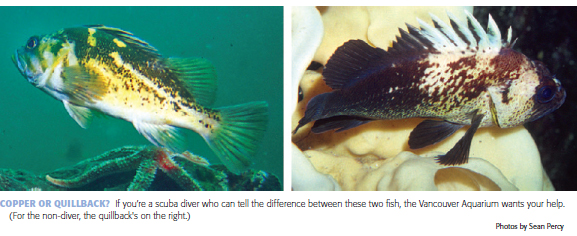Divers sought for rockfish study
Scientists can't be everywhere
By Sean Percy
Scientists at the Vancouver Aquarium are seeking the help of Powell River scuba divers in studying rockfish.
Concern about depleted rockfish stocks has prompted the closure of several areas around Powell River to all hook-and-line fishing. Divers can help gather crucial information about whether those Rockfish Conservation Areas are working, and how the rockfish populations are faring.

Participants in the new Rockfish Abundance Survey simply swim around collecting information about the age and species of rockfish. Or, at least it sounds simple. But identifying rockfish takes a little practice and is a little more challenging than the better-known lingcod egg mass surveys. Fortunately, the aquarium has an online rockfish game developed specifically for BC inshore species, which sometimes have slightly different color patterns than the same species in, say, California. A few minutes with the game, and most divers become familiar with how to identify the different species.
This month is a critical time for scientists studying rockfish. Recent findings by the Vancouver Aquarium dive research team indicate that in BC, some rockfish hide deep in rock piles during winter. Underwater visibility can be low in spring and summer, but in late summer the visibility improves and rockfish tend to be hovering over their rocky homes. So the aquarium has set their Rockfish Abundance Survey for August 14 to September 19 this year.
"It's a lot of fun," says Dr Jeff Marliave, the marine biologist who heads up rockfish studies at the aquarium. Of course, he spends hundreds of hours underwater watching rockfish, and confesses to more than a passing fascination with the spiny fish. During our conversation, he actually forgets the common name of a kind of kelp that's important for rockfish habitat. He can remember only the Latin name Agarum. In his defense, the common name is fringed sea colander kelp, and it doesn't look anything like a colander. Most divers I know call it "the brown kelp that grows along the bottom." But it's indicative of the problems scientists have had in recruiting amateur recreational divers in conducting surveys. Rockfish abundance surveys have flopped in the past.
"Our forms asked for too much information," Marliave admits. "We're willing to compromise, because we just don't have the resources to do it ourselves." Simplified reporting, along with the training game and info on the website, has Marliave hoping more divers will make a splash, especially from areas like Powell River. His team from the aquarium regularly dives in the Howe Sound area, which gets heavy fishing pressure. From their limited forays into the lower Sunshine Coast, the stocks don't appear strong, but there's even less data from the Powell River area.
"Even if we only get good results from Powell River, that's extremely important data."
He says sport divers will be able, over time, to make up their own minds whether rockfish get bigger inside Rockfish Conservation Areas (RCAs) or not.
So far, says Marliave, RCAs aren't working because people don't know they exist. "You have to work to find out where you're not allowed to fish," he says. And then there are blatant poachers who know the RCAs are good places to poach fish. But divers can help spread the word about the importance of not fishing in these protected areas, which will also mean increased enforcement when people report poachers in those areas. In the Vancouver area, fines for poaching in RCAs have exceeded $7,000.
Divers wanting to participate in the surveys should choose to dive in spots where rockfish are found, such as boulder slopes or piles, or in areas with Agarum kelp, or giant plumose anemones, or cloud or boot sponges--which takes in most of Powell River's best dive spots.
For more information on the Rockfish Abundance Surveys, visit www.vanaqua.org and click on the rockfish links, or email lingcod@vanaqua.org, or call 604 659-3440.